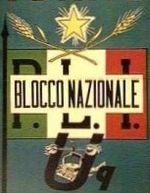History
The alliance scored a poor 3.8% in the election for the House, gaining 16 seats, while a 5.4% was reached for the Senate where the single-man constituencies and the age-restricted suffrage gave an advantage to this list formed by old pre-fascist politicians. The list generally suffered the concurrence of Christian Democracy, which was seen by centrist and right-wing electors as the sole shield against the Soviet-aligned Popular Democratic Front. [2]
The alliance soon disappeared, leaving only as a party with some electoral support.
This page is based on this
Wikipedia article Text is available under the
CC BY-SA 4.0 license; additional terms may apply.
Images, videos and audio are available under their respective licenses.
